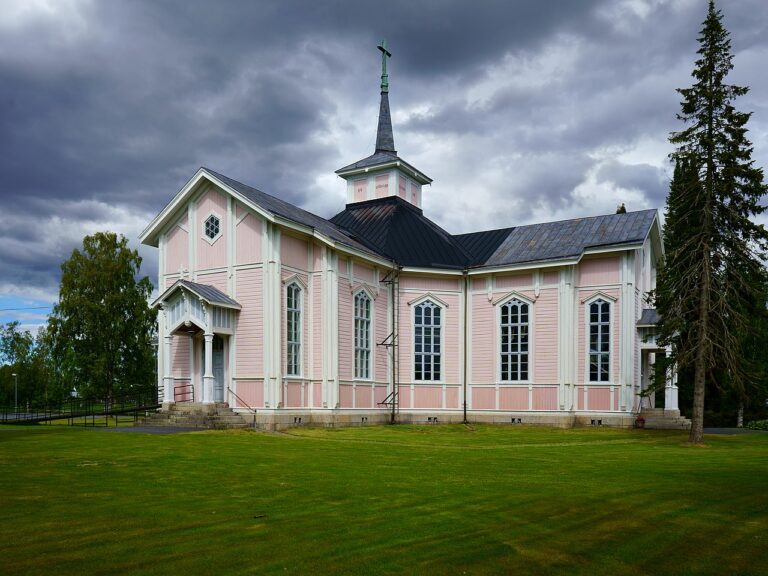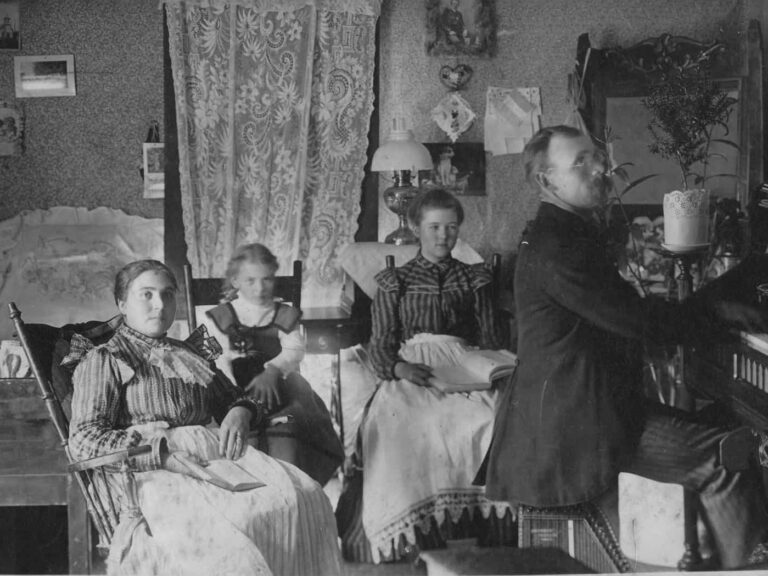By Donald Widjeskog.
Norden, 30 May 2010.
English translation by June Pelo.
When the cold winter is a mere memory, we all set our sights on the coming summer and families with children plan their summer activities. Most of us already had our summer plans made. So it was with me after I had been in the US for three years. My thoughts began to go to my homeland. I had scraped enough money together to go home to visit my family.
This trip, as well as many that followed, was with Iceland Air Charter. At that time the Norden Society used to charter an entire plane to fly to Finland. It was much cheaper to fly the charter than to buy a single ticket from an airline. It allowed me to have money for my visit at home.
From Helsingfors I had to take a train and bus to get home. In Gamlakarleby (now Karleby) I took a bus to Småbönders. The timetable for this bus line was adapted to be suitable for workers who had jobs in Gamlakarleby. It was interesting to sit there in the bus and listen to a familiar dialect that I hadn’t heard for a long time. Old Nedervetil men who were on the way home from work talked about the past. Nedervetil and Gamlakarleby people have a singular sense of humor.
Suddenly I heard one man, who seemed to be the leader for this group, began to talk of a past event. It was about a young mother with her son, who were on their way to the city. When they neared the city the conductor began to collect payment from the passengers. When he came to the young mother he asked her how old the boy was. The mother said, “He is six years old.” The boy exclaimed loudly so all could hear, “No, I am eight years old.” (Children six and under could travel free.) The woman became so embarrassed and red that she hid her face in her hands as if she hoped she could disappear.
Often when I think back on this event, I regretted that I didn’t step up in the bus and say that I was that boy. Surely the men would have appreciated hearing what had become of that outspoken eight-year-old. I was then a typical reserved and stiff Scandinavian. Now, thanks to my dear wife Bernice, I have begun to be half civilized.
I well remember that trip to the city. It was in the autumn when I began school for the second grade. My mother Etel took me to the city to buy clothes for me to attend school. My younger brother Roy wanted to come with us. Despite his tears, he was left home. He didn’t go to school yet so my old worn rags were good enough for him. He was already the same size as I.
There I was going to the city in my bare feet, without shoes, and in thin summer clothes -and I froze in the cold autumn weather as we walked on the cold stone pavement from store to store. My mother warned me, not in so many words, that I should shut up when she bargained about the price. I decided not to put my foot in my mouth twice on the same day. My mother, a war widow with six children, stretched out each penny as much as she could. When we went into Åström’s clothing store, suddenly I found myself looking into Roy’s eyes. I could not understand the impudence this young scamp had – that he had the nerve to follow us all the way to the city! Since I was the oldest of the boys, I was also the boss. I exclaimed “Why are you here – go home! There I stood, talking before a large mirror that stood in the way. I thought I was looking at my brother. I don’t remember if we owned a mirror when I was a child.
I had been away only three short years so there were many changes during that time. All of my friends had families and permanent jobs. The girls that I had known were also married. I had difficulty understanding this. The economical and social conditions had moved ahead in great strides. When I talked with parliament member Ragnar Granvik and mentioned how surprised I was by progress that had been achieved, he said that ‘we take the best from Sweden and adapt it for our own conditions.’
After I had been home for some weeks and visited all our friends and relatives, I began to have the feeling that I had worn out my welcome. It was not because I was not welcome. No, on the contrary, I was always welcome. But they all had their own lives that had developed while I was away. I was no longer part of their lives. I began to feel all the more that I was an American. I had planted my roots here in the USA.
One Saturday evening I sat there with my mother and watched a variety program on a Finnish TV channel that showed a fine re-run of “Fiddler on the Roof.” I had recently seen that show on Broadway. Afterwards there was an interview with the American movie star Gregory Peck. I was surprised that he talked fluent Finnish. His wife, Greta, came from Finland. Later much was written about Gregory Peck in the Finnish weekly newspapers. One female bath attendant, Leena, at Vaakuna hotel where Peck stayed became well-known because she took a sauna with him during his visit there.
When it was time for me to go back to the US it was difficult to bid goodbye to my mother. Many tears fell when my brother Sten drove me to the railroad station. I was sure I would never see her again. She was so old – 53 years! Such was my thought when I was a young man. But my mother later came to America three times. The first time she lived with me for two years when I began to study at the university. She had a job as a temporary maid for a millionaire in Manhattan. Brave she was when she took the subway from the Bronx to Manhattan by herself. Not bad for a farmer’s wife from Småbonders.
On my return trip I took the night train to Helsingfors and arrived early in the morning. I had the entire day to visit the city. Departure time for my flight was in the evening. Helsingfors was no longer so eye-catching to me. After all, I now lived in the center of the universe, New York City! So I went around Helsingfors and observed the city and all it had to offer. I was also in the cathedral, the parliament building and many times in the new Kiasma museum.
During my wanderings I found myself in front of the Vaakuna hotel. It was time for lunch and I thought that if this restaurant was good enough for Gregory Peck, it was good enough for me. I was served by a friendly waitress. I mentioned to her that I saw Gregory Peck on TV and I had read of his sauna at the hotel. She said, “You can also bathe here if you wish.” I thought if it was good enough for Gregory Peck, it would be good enough for me. There I found myself naked in the sauna with Leena, built like a heavyweight wrestler. She poured water on the hot baked stones so the steam belched out like a volcano. She stood and hit me with a bunch of birch twigs so that I was as red as a cooked crayfish. Then she tossed me on a bench and washed me up and down and gave me a thorough massage so that my muscles ached. I have never been so roughly handled by a woman such as she. But it was actually refreshing. After that I rested a short time on a wooden bench. When I finally came out of the hotel I was a new man. There I floated along the street for everyone to see and admire. I was a “Gregory Peck.”
Additional note from June Pelo:
Donald wrote about his first trip to America, titled “Here I come, America”.





